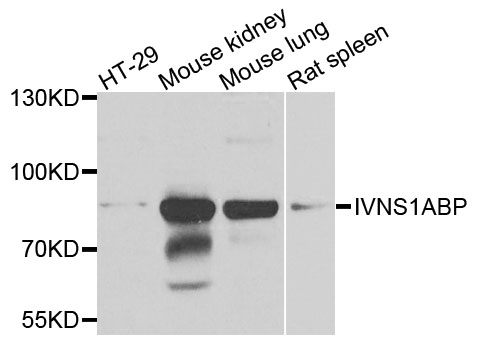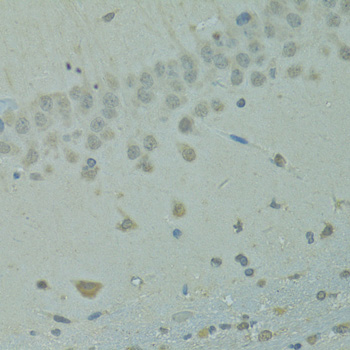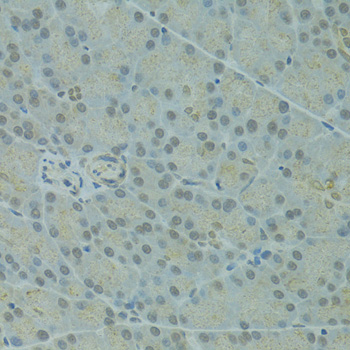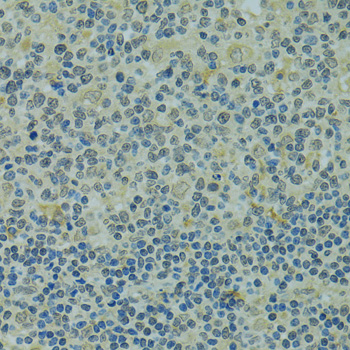-
Product Name
IVNS1ABP Polyclonal Antibody
- Documents
-
Description
Polyclonal antibody to IVNS1ABP
-
Tested applications
WB, IHC
-
Species reactivity
Human, Mouse, Rat
-
Alternative names
IVNS1ABP antibody; FLARA3 antibody; HSPC068 antibody; KLHL39 antibody; ND1 antibody; NS-1 antibody; NS1-BP antibody; NS1BP antibody; influenza virus NS1A-binding protein antibody
-
Isotype
Rabbit IgG
-
Preparation
Antigen: Recombinant fusion protein containing a sequence corresponding to amino acids 1-300 of human IVNS1ABP (NP_006460.2).
-
Clonality
Polyclonal
-
Formulation
PBS with 0.02% sodium azide, 50% glycerol, pH7.3.
-
Storage instructions
Store at -20℃. Avoid freeze / thaw cycles.
-
Applications
WB 1:500 - 1:2000
IHC 1:50 - 1:200 -
Validations

Western blot - IVNS1ABP Polyclonal Antibody
Western blot analysis of extracts of various cell lines, using IVNS1ABP antibody at 1:1000 dilution.Secondary antibody: HRP Goat Anti-Rabbit IgG (H+L) at 1:10000 dilution.Lysates/proteins: 25ug per lane.Blocking buffer: 3% nonfat dry milk in TBST.Detection: ECL Basic Kit .Exposure time: 30s.

Immunohistochemistry - IVNS1ABP Polyclonal Antibody
Immunohistochemistry of paraffin-embedded rat brain using IVNS1ABP antibody at dilution of 1:100 (40x lens).

Immunohistochemistry - IVNS1ABP Polyclonal Antibody
Immunohistochemistry of paraffin-embedded rat pancreas using IVNS1ABP antibody at dilution of 1:100 (40x lens).

Immunohistochemistry - IVNS1ABP Polyclonal Antibody
Immunohistochemistry of paraffin-embedded human tonsil using IVNS1ABP antibody at dilution of 1:100 (40x lens).
-
Background
Involved in many cell functions, including pre-mRNA splicing, the aryl hydrocarbon receptor (AHR) pathway, F-actin organization and protein ubiquitination. Plays a role in the dynamic organization of the actin skeleton as a stabilizer of actin filaments by association with F-actin through Kelch repeats (By similarity). Protects cells from cell death induced by actin destabilization (By similarity). Functions as modifier of the AHR/Aryl hydrocarbon receptor pathway increasing the concentration of AHR available to activate transcription. In addition, functions as a negative regulator of BCR(KLHL20) E3 ubiquitin ligase complex to prevent ubiquitin-mediated proteolysis of PML and DAPK1, two tumor suppressors. Inhibits pre-mRNA splicing (in vitro).; (Microbial infection) Involved in the alternative splicing of influenza A virus M1 mRNA through interaction with HNRNPK, thereby facilitating the generation of viral M2 protein.
Related Products / Services
Please note: All products are "FOR RESEARCH USE ONLY AND ARE NOT INTENDED FOR DIAGNOSTIC OR THERAPEUTIC USE"
